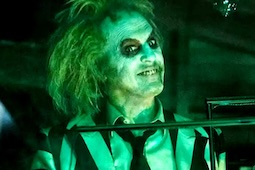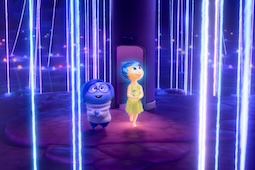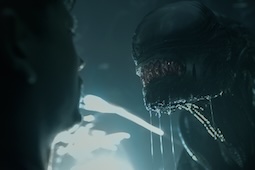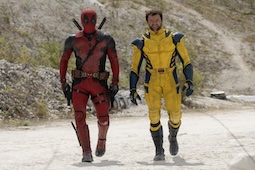
Tenet has finally arrived on Cineworld screens in the UK and Ireland, ready to overwhelm, amaze and confound. Christopher Nolan's sweeping tale of 'time-inversion' and a world in danger is the first big-screen blockbuster in nearly six months, and is shouldering the weight of huge expectation.
If you've already seen it, here's our spoiler-filled breakdown of the film's ending. Not yet taken the journey? Be sure to return here at a later date.
WARNING: MAJOR TENET SPOILERS AHEAD
"Don't try to understand it. Just feel it." So says Clemence Poesy's scientist to John David Washington's unnamed Protagonist at the outset of Tenet. The film is the latest brain-melting extravaganza from Inception filmmaker Christopher Nolan, and far from being a throwaway line, it seems more like the mantra of the entire movie.
Nolan has described Tenet as his "most ambitious" movie so far, and on first viewing, it's hard to argue. The movie is painted on a huge scale, with a budget that stretches upwards of $200 million, and a sense of globe-trotting expanse that takes in London, Mumbai, Estonia, Norway and more. Handsomely shot by Interstellar and Dunkirk DP Hoyte van Hoytema in IMAX, the film arrests the attention, not least with its audacious action sequences that are shot once going forwards and then again going backwards.
The latter point gets to the heart of Nolan's theme, the idea that entropy (at its very crudest level, the forward flow of thermodynamic energy) can be reversed, and that the future can communicate directly with the past. The fabric of the reality that we know is but a veil that can be torn asunder, a notion that Nolan gleefully runs with during a number of jaw-dropping set-pieces. This includes a jumbo jet crashing into a building while shedding gold bullion out the back (done for real – as usual with Nolan, there's little CGI), and a car chase in which the participants are alternately charging forward and 'inverted' (as in moving forwards against the backwards flow of time).
The movie is essentially 007 with a temporal imbalance – imagine, "Bond James. Bond name's The." Was that confusing to read? Magnify the philosophy to two and half hours, replete with an eardrum-ripping sound design and striking cast (Robert Pattinson, Elizabeth Debicki, Kenneth Branagh, Michael Caine, Himesh Patel, Dimple Kapadia, Aaron Taylor-Johnson) and, in all honesty, it still probably doesn't come close to the disorienting impact of the film.
The combination of highfalutin concepts with popcorn-friendly spectacle is, by now, a Nolan trademark. Inception, for example, literalised the layers of subconscious as a rumbling, cavernous Rubik's Cube of deadly environments. These ranged from twisting hallways to frigid, snow-blasted fortresses, with time unfolding at temporal different speeds relative to the subconscious layer above it. It was an espionage movie that peeled away the genre conventions to explore the loneliness of Leonardo DiCaprio's Dominic Cobb, whose own subconscious is haunted by his deceased wife Mal (Marion Cotillard).
But Inception isn't the only Nolan movie that has been consumed by the notion that time is mutable, or subjective. All of his films, stretching back to the early days of Following (1998) and Memento (2000), have been feverishly, even obsessively, taken with this idea. Memento, for example, utilised a tremendous non-linear structure to put us in the scrambled head-space of Guy Pearce's vengeful loner, on the hunt for his wife's killer while suffering from short-term memory loss.
Tenet, therefore, could be seen as the apex of this obsession, with Nolan utilising his formidable creative control to become ever more uncompromising with his themes. Surely no other director would have secured $200 million to make a movie around the dry-sounding concept of entropy, but this is the privileged position that Nolan has steadily worked his way into over the last two decades. It's no surprise to learn that Nolan enlisted physicist Kip Thorne, who worked on the Interstellar script, to ground Tenet's fantastical concepts in something approaching scientific plausibility.
So, what does the movie ultimately mean? At the time of writing, I confess I've only seen the movie once, and at the ending of that particular IMAX screening, I came out thoroughly bamboozled and overwhelmed. I wasn't sure if I actually understood the movie, at least on a point by point basis, but I felt I was able to grasp the central emotional core of what was happening. As stated earlier, this is something that one needs to feel in their bones, rather than unpick on a purely pragmatic level.
Based on what I've just said, I won't attempt to recap all the plot points that lead to the movie's gargantuan, explosive climax. That's rife with the potential for mistakes that might misrepresent the narrative. Suffice it to say, Washington's central character, in league with cohort Neil (Pattinson), the abused Kat (Debicki) and a crack squad of operatives, succeed in foiling the nefarious Andrei Sator's (Branagh) plan to destroy the world. Essentially, Sator wants to reverse the polarities of time and obliterate life as we know it, because he was exposed to deadly radiation at a young age and is now a bit peeved about it.
At least, I think that's what it all means. That the final conflict occurs along two planes of time, one moving forward, the other inverted, with only coloured armbands to distinguish between the two parties, only makes it more challenging. There's no denying the technical audacity of what we're seeing, as Washington's character progresses in conventional motion while Pattinson's inverted character can see where Washington is headed before he gets there. This involves exploding buildings piecing themselves back together and much more. Once again, time is a subjective measure in Nolan's world, and it makes for arresting, if undeniably confusing, cinema.
The climax of Tenet is, therefore, a pure, undistilled expression of Nolan's great obsession. He's moved from the low-budget realm of Memento, where such conceits had to be conveyed through dialogue and supple narrative trickery, into gargantuan visual expressions of such themes. In Tenet, Nolan appears to be advocating a show don't tell philosophy, although this doesn't exactly mesh with an exposition-heavy screenplay that is constantly forced to distill complex ideas for the audience.
Tenet is, therefore, something of a contradictory experience, high-minded yet old-fashioned, respectful of an audience's intelligence but also bound by the need to explain itself. It's both a creakily nostalgic James Bond pastiche and a film that attempts to smuggle impenetrable concepts into the blockbuster realm. For me, however, the real impact of the movie came in the closing moments, which exposed a meta-narrative that I found rather poignant in the blighted 2020 era of COVID-19.
At the end of the film, it turns out that Pattinson's character Neil has acute knowledge of the future. In fact, it was The Protagonist who inverted himself in the future and began the Tenet operation, recruiting Neil in the process, revealing that they have in fact known each other for years. The 'current' version of The Protagonist will therefore be marching towards that future moment, effectively closing the loop on his 'current' and 'future' selves. Nolan depicts time as a cyclical entity, something that's also emphasised when Kat, after killing Sator, jumps off his luxury yacht. The film's structure matches the palindromic nature of its title.
This is glimpsed by the 'other' Kat from the past, who is approaching the yacht having fetched her son from dry land – the two iterations of the one character are effectively resolved during the final moments of the movie. This occurs when The Protagonist watches Kat pick her son up from outside the gates of his school. The temporal flow has been restored and the world has been saved without anyone, other than the main participants, knowing about it. It's a message that, I believe, invests Tenet with added resonance in these troubled times.
The idea of the unseen hero, battling difficult odds and establishing a new order of things, could very well be a reflection of Nolan's directorial position, all the more so in 2020. As far as the audience is concerned, he's the unseen wizard behind the curtain, sculpting the film's personality and intricacy without us ever seeing him in the flesh. In making Tenet, he sought to avoid CGI and fashion everything practically, from plane crashes to reverse fight scenes and car chases. The boldness of the approach has made him something of a hero during the 2020 summer blockbuster season, arresting our attention by maximising the impact of the big screen, during turbulent times where we've been denied such an environment for several months.
Nolan's commitment to the purity of cinema means he's well-aligned to the altruism of the film's characters. He's staked everything on attempting to redeem the cinema industry in what is possibly the toughest year it's ever faced, having faced an uphill struggle, including multiple release date delays, to get Tenet on the big screen. Whatever one thinks of Tenet's narrative, the movie confirms Nolan as a craftsman who is never less than willing to make things difficult for himself. That said, the idea of the character as a surrogate for Nolan isn't particularly original – one need only look at Tom Hardy's fighter pilot Farrier in Dunkirk as another reflection of single-minded, quietly virtuous goal-setting.
However, the characters in Tenet ultimately see their efforts come to fruition; it's currently unclear if Nolan's own sacrifice and drive for perfection will pay off at the box office. Of course, Tenet was shot in 2019, way before the coronavirus pandemic reared its head. It now suffers the effects of being released in the midst of it. Therefore, the movie has gained mystique and resonance it might not otherwise have had – I probably wouldn't be writing about these implicit undertones had the movie been released on 17th July 2020 in a non-pandemic situation, as originally planned.
But that in and of itself is a reflection of 2020's topsy-turvy environment. In a period where we all find ourselves reflecting on the passage of time and the fragility of our existence, the coronavirus pandemic has bolstered Tenet with additional meaning. The bewildering scramble of the film's narrative is, ironically, better-aligned to where we all currently find ourselves. The notion of self-sacrifice, both on a narrative and directorial level, resonates all the more strongly in an era where divisions are rife. And the intravenous, adrenaline-stoking excitement of the action sequences reminds us that imagination and creativity, especially when painted on the biggest screen possible, are key to pulling us through the darkest of times. Ultimately, to feel the movie is to understand it.
Ready to take the trip again? Then click here to book your tickets for Tenet and tweet us your reactions to the film's ending @Cineword.












.jpg)


.jpg)
.png)






